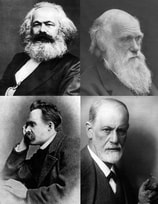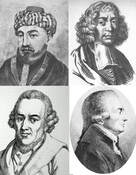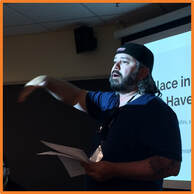Teaching
Teaching Awards
Temma Berg-Buz Myers Award for Teaching Excellence in Jewish Studies - Gettysburg College, 2023
Dr. Ralph Cavaliere Endowed Teaching Award - Gettysburg College, 2017
Philosophy Department CETA (Committee for the Education of Teaching Assistants) Teaching Award - Purdue University, 2012
Dr. Ralph Cavaliere Endowed Teaching Award - Gettysburg College, 2017
Philosophy Department CETA (Committee for the Education of Teaching Assistants) Teaching Award - Purdue University, 2012
Teaching philosophy is a political and aesthetic practice. It is political in that philosophy is emancipatory, in Kant’s sense of liberating one from self-perpetuated immaturity. Philosophy irreversibly opens the student to the world in all its unapologetic complexity, while at the same time providing them with concepts and strategies for thinking with this complexity. The result is a lifelong expansion from which there is no turning back. My part in the process is akin to the role of an artist. My job is not to indoctrinate, but to illuminate new ways of thinking and of seeing the world. The moment the student is comfortable in their conviction, my job is to complicate the position. The goal is not to spur the student to abandon their position, but rather to encourage them to internalize an ongoing commitment to honing their own critical, philosophical acumen. In this sense, the philosophy teacher is an artist – contributing to the cultivations of students by enabling them to shape themselves.
Upcoming Courses
Postmodern Christian Philosophers (Fall 2023)
Reading Cormac McCarthy (Spring 2024)
Violence and Revolution
Reading Cormac McCarthy (Spring 2024)
Violence and Revolution
Recent Courses Taught

MARX, DARWIN, NIETZSCHE, FREUD: FOUR HORSEMEN OF THE APOCALYPSE (Fall 2022) - In the span of a single century, and from completely different areas of study, these four thinkers completely revolutionized the way that human beings understand themselves and their place in the cosmos. Displacing the Enlightenment notion of the self-interested, rational agent who reflects the image of God with an innate sense of the Good, these thinkers tore back the veils of all of our most cherished idols – God, language, justice, morality, rationality, market forces, and cosmic order. Their works not only overturned millennia of cultural assumptions; they prophesied the horrors of the 20th century, and established the framework of critical suspicion that informs much of humanistic study to this day.
LITERATURE, LANGUAGE, AND LIFE (Spring 2021) - In this course, we will explore the unique ways in which literature enables human beings to make meaning – philosophical, religious, cultural, etc. – out of their lives. With its broad popular and cultural appeal, literature fires the imagination, plays with the limits of language and meaning, and enables us to conceive the world differently. It allows us to explore subjectivity more intimately and richly than the artistic media of cinema or theater, and paints the world and ourselves more vividly than any visual art. Throughout history, literature has served in the roles of political resistance/subversiveness, ethical instruction, cultural transmission and/or critique, philosophical and religious exploration, and subjective and collective experimentation. In this course, we shall engage with philosophical and cultural questions and concepts as they have woven in and out of some of the most influential novels of the past few centuries. We will also be addressing, along the way, some of the major characteristics of the dominant artistic and cultural periods, such as Romanticism, Surrealism, Modernism, Postmodernism, and Metamodernism.
MICHEL FOUCAULT (Spring 2024) - Few thinkers from the 20th century had a broader or more lasting impact than Michel Foucault. Giving a new meaning to the adage, ‘knowledge is power,’ Foucault’s work challenges accepted orthodoxies regarding the concept of ‘truth’ by examining fundamental questions of political and epistemic organization, and showing that the seemingly ‘objective’ values of truth and knowledge often serve the interests of specific structures and institutions of power across various institutions. Fueled by the turmoil of the 1960s, Foucault’s writing crosses traditional disciplinary boundaries, leaving an indelible mark in areas as diverse as philosophy of education, history, literary theory, sociology, anthropology, aesthetics, health studies, epistemology, gender and sexuality studies, and prison reform. In this course, we will engage closely with the work of Michel Foucault, through close readings of key texts across every major epoch of his career.
QUENTIN TARANTINO (Spring 2023) - In the history of the cinema, there have been few directors on the level of Quentin Tarantino. A “director’s director,” Tarantino spent his youth immersed in the global films and television series of the 50s, 60s, and 70s; and every film that he makes is a love song to these genres of popular entertainment. However, as with any good love ballad, there is also a bit of an edge in Tarantino’s engagements with these genres, as these genres have historically reflected the pernicious cultural biases of their times. As such, Tarantino undertakes what we might call “genre-bending” with his craft, adopting the tropes and structures of popular genres while also constantly twisting and subverting them in subtle ways. Tarantino’s work, therefore, is what we might call “metacinema” or “cinematic metafiction” – Tarantino makes movies about what it means to make movies, and with a constant eye toward the ways in which popular culture consumes entertainment. In doing so, he strikes a balance that very few directors in history have been able to strike: he makes films that are deeply artistic, critical, and challenging, but that also have broad popular, blockbuster appeal. In this course we will engage with the entirety of Tarantino’s directorial corpus, examining the ways in which his films are both informed by and pose challenges to the genres after which they are fashioned.

JEWISH THOUGHT AND THE ENLIGHTENMENT (Fall 2021) - The ‘Enlightenment’ designates a broad cultural and intellectual movement that occurred over the course of the 17th and 18th centuries. With intertwined emphases on critique over tradition, science and reason over faith, the individual over the collective, republicanism over monarchism, the secular over the religious, and capitalism over feudalism, the Enlightenment marked a genuine revolution that affected every corner of the Western world. The radical impact of this movement is all the greater against the backdrop of Jewish intellectual life, as the cultural and intellectual space of Judaism itself within the history of the West had always been precarious and ill-defined. As a result, the collisions and renegotiations between Enlightenment thinking and Jewish thinking provide rich and fertile soil for intellectual exploration and innovations. This course will look at some of the key writings of Jewish thinkers who grappled with the implications of Enlightenment thinking, and who left a lasting impact on Jewish and Christian thinking, and on Western thought more broadly. The figures to be explored are Moses ben Maimon (Moses Maimonides), Benedict de Spinoza, Moses Mendelssohn, and Solomon Maimon. From Maimon to Maimon, we will explore questions concerning the relation between revelation and reason, religion and the state, humanity, nature, and God.
KAFKA (Summer 2022) - Few authors have left an impact so extensive and polymorphous as Franz Kafka. Kafka was born in 1883 in Prague, part of the Austro-Hungarian Empire. Aside from a few collections of short stories, Kafka published almost nothing during his life, and asked of his friend that all of his unpublished works—manuscripts, letters, diaries—be burned upon his death. Fortunately for us, the friend failed to heed Kafka’s request. In this course we will be reading the major literary works of Kafka—his three novels and several of his short stories—along with Deleuze and Guattari’s work on Kafka, one of the most famous works of philosophical literary criticism of the 20th century. We will be considering topics and questions pertaining to madness and reason, faith and the absurd, power and its impact on everyday life, and the relation between literature, art, and life.
READING DOSTOEVSKY (Fall 2021) - Fyodor Dostoevsky was a living contradiction – at the intersections of peasantry and nobility, reason and passion, and philosophy and religion, Dostoevsky explored the depths of human experience with a courage and honesty unmatched by most authors before or since. He lived and was politically active in the midst of Russia’s tumultuous 19th century, and left behind some of the most monumental and influential novels ever written. In this course, we will explore the ethical, political, and philosophical elements of Dostoevsky’s thought, through close readings of Notes from Underground, Crime and Punishment, Demons, and The Brothers Karamazov. We will analyze topics pertaining to faith and doubt, freedom and responsibility, reason and desire, love and sacrifice, along with Dostoevsky’s lasting impact on 20th century thought.

THE FILMS OF TERRENCE MALICK (Spring 2019) - Terrence Malick is one of the most enigmatic and unique directors working in cinema today. Malick’s work challenges American founding myths, transgresses the boundaries between the arts of film, literature, music, philosophy, and photography, and constantly tests the limits of audience expectations. But in doing so, it also explores both the profound and the mundane within the human experience, with a beauty and simplicity that are undeniably authentic. In this course, we will explore the aesthetic, ethical, religious, philosophical, and cultural aspects of Malick’s work, through close analyses of his eight feature films, along with relevant critical literature. Particular focus will be given to Badlands, The Thin Red Line, The New World, The Tree of Life, To the Wonder, and Knight of Cups.

PLATO, PERSONHOOD, AND POPCORN: BIG IDEAS ON THE BIG SCREEN (Fall 2021) - This first-year seminar is a philosophical exploration, through both text and film, of the nature of the self and its relationship to the world. It addresses questions concerning the experience of time and its relation to memory, the nature and value of thinking as a practice of everyday life, cinematic representations of gender, and the roles and limitations of human knowledge and technology. In addition to textual analysis, the course examines these questions with provocative films in the history of the cinema, mining and developing strategies for watching movies at various intellectual levels, thereby enriching the overall experience of the capabilities of film, and illuminating the significance of philosophy as a living activity of thought that finds and transforms us in even the most seemingly mundane moments.
READING DAVID FOSTER WALLACE (Spring 2018) - David Foster Wallace is best known as the author of the twentieth century literary masterpiece, Infinite Jest. But Wallace’s first love was academic philosophy. A ‘philosopher with a fiction hobby,’ Wallace used fiction to bridge the divide between the cold precision of philosophy of language, and the flesh and blood world of human relationships. And he was that rare figure who successfully balanced the roles of insightful critic of pop culture, literary titan skilled at both intellect and emotion, and thinker taken seriously by academic philosophers of all ideological stripes. In this course, we will read Infinite Jest – one of the most important novels of the twentieth century – along with a handful of Wallace’s essays and short stories. Through these readings, we shall explore philosophical questions pertaining to loneliness, language and truth, desire, intimacy, empathy, celebrity, consumption and addiction, media and advertising, the allure of the image, selfhood and the meaning of transcendence. It is sure to be an enriching and stimulating journey!
Other Courses Taught
Gettysburg College
PHIL 101: Introduction to Philosophy
PHIL 105: Contemporary Moral Issues
PHIL 205: Ancient Greek and Roman Philosophy
PHIL 206: Medieval and Renaissance European Philosophy
PHIL 207: Early Modern European Philosophy
PHIL 208: Kant and 19th Century European Philosophy
PHIL 219: Philosophies of Peace and Non-Violence
PHIL 225: Existential Philosophies
PHIL 227: Beyond Terrorism
PHIL 237: Philosophy of Religion
Purdue University
PHIL 110: Introduction to Philosophy
PHIL 111: Introduction to Ethics
PHIL 330: Religions of the East
PHIL 331: Religions of the West
Indiana University Kokomo
PHIL P100: Introduction to Philosophy Through Film
PHIL P140: Introduction to Ethics
PHIL 101: Introduction to Philosophy
PHIL 105: Contemporary Moral Issues
PHIL 205: Ancient Greek and Roman Philosophy
PHIL 206: Medieval and Renaissance European Philosophy
PHIL 207: Early Modern European Philosophy
PHIL 208: Kant and 19th Century European Philosophy
PHIL 219: Philosophies of Peace and Non-Violence
PHIL 225: Existential Philosophies
PHIL 227: Beyond Terrorism
PHIL 237: Philosophy of Religion
Purdue University
PHIL 110: Introduction to Philosophy
PHIL 111: Introduction to Ethics
PHIL 330: Religions of the East
PHIL 331: Religions of the West
Indiana University Kokomo
PHIL P100: Introduction to Philosophy Through Film
PHIL P140: Introduction to Ethics
